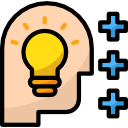Course Content
Course Content
The course is structured into 3 Units. Students will learn the fundamentals of the subject and develop skills valued by Higher Education and employers, including critical analysis, independent thinking and research. In all units students will need to be able to demonstrate knowledge and understanding and the ability to apply and analyse information. This will be developed through study of the specification and through ethical and practical research activities.
Unit 1: Introductory topics in Psychology
Unit 2: Psychology in Context
Unit 3: Issues and debates /options in Psychology
Optional sections where one topic is taken from each section.
A) Relationships, Gender or cognition and development.
B) Schizophrenia, Eating Behaviour or stress.
C) Aggression, Forensic psychology or addiction.
The course is structured into 3 Units. Students will learn the fundamentals of the subject and develop skills valued by Higher Education and employers, including critical analysis, independent thinking and research. In all units students will need to be able to demonstrate knowledge and understanding and the ability to apply and analyse information. This will be developed through study of the specification and through ethical and practical research activities.
Unit 1: Introductory topics in Psychology
- Social influence: covering conformity (majority and minority influence), obedience independent behaviour and processes involved in social change.
- Memory: Models of memory, (Multi store and working memory)types of long term memory, Explanations of forgetting, Eyewitness testimony and the cognitive interview.
- Attachment: Caregiver-infant interaction, Animal studies of attachment, Explanations of attachment, Types of attachment, Deprivation and influence of early childhood experiences on relationships.
- Psychopathology: Definitions of abnormality, Characteristics of phobias, depression and OCD, behavioural explanations and treatment for phobias, Cognitive explanation and treatments for depression and biological explanations of treatments of OCD.
Unit 2: Psychology in Context
- Approaches in Psychology: The basic assumption of and comparison between the learning , cognitive, biological, psychodynamic and humanistic approach in psychology.
- Biological psychology: understanding the divisions of the nervous system, the structure and function of sensory, relay and motor neurons, the body’s response to stress, localisation of functions in the brain, ways of studying the brain and bodily rhythms.
- Research methods: experimental methods, observational and self- report techniques, correlations content analysis and case studies.
- Scientific processes including: experimental design, reliability and validity and reporting psychological investigations.
- Data analysis including: quantitative and qualitative data and descriptive statistics.
- Inferential statistics: including factors that affect the choice of statistical tests.
Unit 3: Issues and debates /options in Psychology
- Issues and debates in psychology: (Compulsory section),Gender and cultural issues, free will and determinism and the nature nurture debate, holism and reductionism, idiographic and nomothetic approaches as well as ethical implication.
Optional sections where one topic is taken from each section.
A) Relationships, Gender or cognition and development.
B) Schizophrenia, Eating Behaviour or stress.
C) Aggression, Forensic psychology or addiction.
Assessment
- Unit 1: written exam: 2 hours 96 marks in total 33.3% of A-level
- Unit 2: written exam: 2 hours 96 marks in total 33.3% of A-level.
- Unit 3: written exam: 2 hours 96 marks in total 33.3% of A-level
Entry Requirements
9-4 or A*-C in at least seven different subjects, including English and mathematics which would usually be at grade 4 or above, including a 6 grade in Additional Science or Biology.
For further details... |



